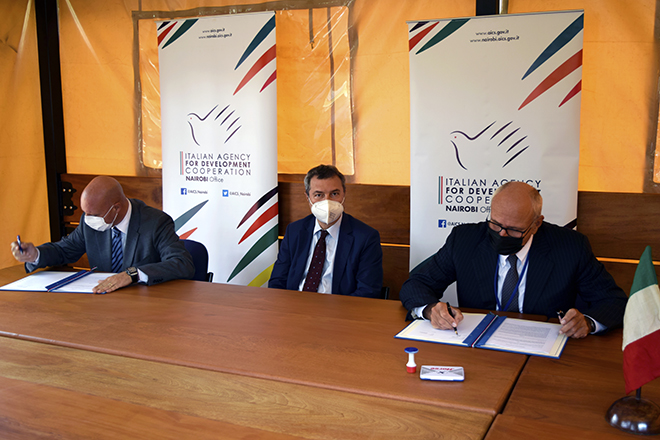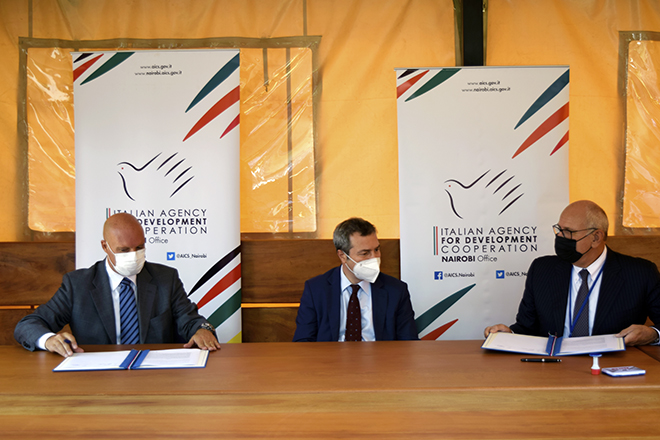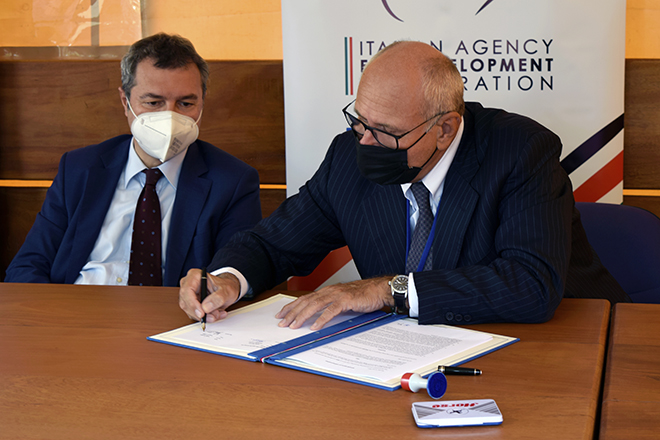Nairobi (Kenya), 22 luglio 2021 –Eni, tramite la consociata Eni Kenya, e la Sede di Nairobi dell’Agenzia italiana per la cooperazione allo sviluppo (Aics) hanno firmato oggi, alla presenza dell’Ambasciatore d’Italia in Kenya S.E. Alberto Pieri, un Memorandum per individuare possibili opportunità di futura collaborazione in settori chiave per lo sviluppo del Paese quali agricoltura e catene del valore, dell’ambiente, della salute, della formazione e dell’istruzione professionale, nonché dell’accesso all’energia/energia verde e all’innovazione. Il documento è stato firmato dal Managing Director di Eni Kenya Enrico Tavolini e dal Titolare dell’Ufficio di Nairobi di AICS Fabio Melloni.
L’accordo, dalla durata quadriennale, intende promuovere e rafforzare il “Sistema Italia” all’estero e si inserisce nella strategia di Eni e Aics di far leva sui partenariati pubblico-privati, che le Nazioni Unite indicano come strumento chiave per il raggiungimento degli Obiettivi di Sviluppo Sostenibile dell’Agenda 2030. Inoltre, questo accordo è in linea con la legge 125/2014 sulla cooperazione, che riconosce il contributo del settore privato nella definizione e nell’attuazione di progetti di sviluppo sostenibile.
L’accordo permetterà ad Eni Kenya e Aics in Kenya di identificare e sviluppare progetti di collaborazione futura, in coerenza con gli obiettivi strategici di sviluppo sociale del Governo del Kenya e in linea con le loro attività svolte nel Paese.
Eni opera in Kenya dal 2013, con attività di esplorazione offshore Oil & Gas nel Bacino di Lamu, e con iniziative industriali che integrano l’economia circolare lungo la filiera per la produzione di biocarburanti. Inoltre, Eni contribuisce alle iniziative di sviluppo locale della National Oil Corporation of Kenya (NOCK) nei settori chiave dell’istruzione, della salute e dell’acqua, e dei servizi igienico-sanitari.
La sede Aics di Nairobi ha una lunga esperienza nel Paese e una vasta rete con altre Agenzie di Cooperazione, Organizzazioni della Società Civile e Organizzazioni del Sistema delle Nazioni Unite. Il Kenya, inoltre, è un Paese strategico per l’Italia e la sua Agenzia di Cooperazione dalla fine degli anni Novanta, dove ha consolidato i suoi tradizionali ambiti di intervento quali agricoltura e irrigazione, WASH, sviluppo territoriale e umano, con particolare attenzione a sanità, educazione e settore privato.


